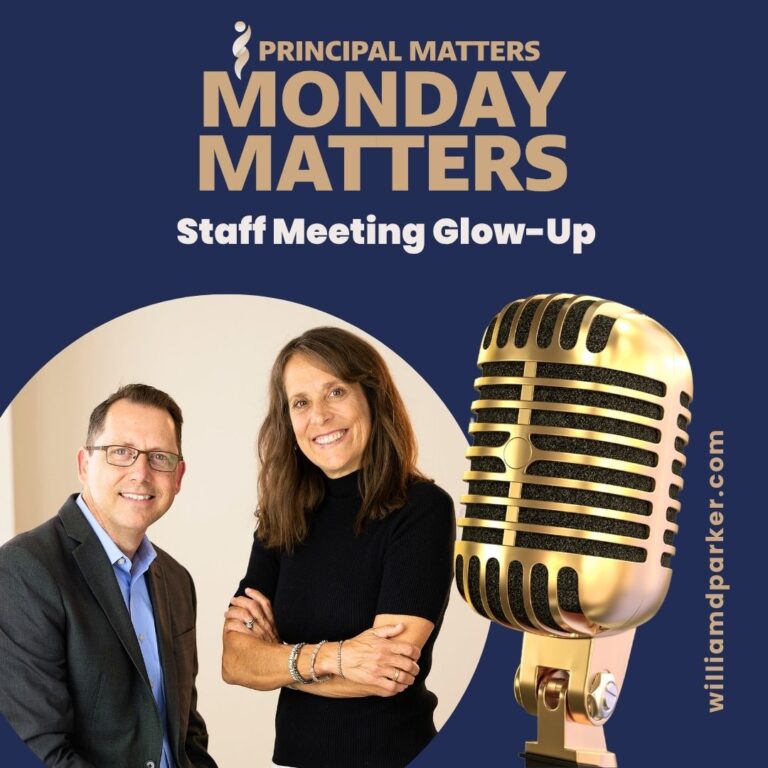Podcast: Play in new window | Download
In this week’s episode of Monday Matters, Will Parker and Jen Schwanke discuss the challenges that school leaders face as they navigate both the mundane and complex aspects of their job. They offer advice on how to lead through the ordinary and fight boredom in the job of a school leader by reconnecting to one’s purpose and finding joy in the day to day operations of a school. Below is a thoughtful post by Will Parker that highlights some of the topics covered in this episode.
Mending Fences and Leading Through the Ordinary, by William D. Parker
Last week, I presented at a conference in Little Rock, Arkansas, which also gave me an excuse to drive across the Mississippi River afterwards and visit the family farm in West Tennessee. My brother Jesse runs cattle on the old homeplace where my parents lived before they passed. It’s still the gathering place for family Christmases that include around thirty people representing siblings, grandchildren, and great-grandchildren.
My brother and I decided to mend some fences while I was there. Armed with a roll of barbed wire, a pair of fencing pliers, and a fence stretcher, we headed to the lowest pasture where a fallen tree had crushed five strands of wire. Jesse started by cutting the tree into sections with a chainsaw while I hauled the limbs and sticks into the nearby woods. Once the debris was cleared, we stretched new barbed wire so we could reattach the old wire to the fence line where it had broken. We also had to straighten a couple of bent metal posts.
I told him later that it was my favorite part of being home.
A few days later, I was back at my desk working in my office. That morning, I led a training session with a group of leaders from the state of Ohio. That afternoon, I had a Zoom call with a leader across the country who was interested in being a guest on my podcast. He was working on a new book, and I encouraged him to reach back out once he had finished it so we could schedule a show.
For some reason, during that meeting, I found myself anxious to end the call. It was an odd feeling. Normally, I enjoy these kinds of exchanges with fellow educators because it’s always fun to share our interests in schools and talk about lessons learned. On this particular call, however, I caught myself thinking: This feels like a conversation I’ve had a few hundred times already.
When the call ended, I began reflecting on why I felt that way—and the reason was pretty obvious. I had literally had similar conversations hundreds of times. What was once novel and interesting was becoming commonplace. The amount of energy I needed to stay focused was becoming harder to maintain.
Later, I was sharing this story with a friend when my son, Jack, overheard the conversation. That afternoon, he said to me, “Dad, I heard what you said about it feeling odd to find yourself becoming bored with your work. It sounds to me like maybe you need a reminder that sometimes a job requires work.”
He went on to say, “I don’t always like my college classes. But right now it’s the ‘job’ I have to help me finish my degree, and I realize that not everything I learn or do is always going to be enjoyable. I thought maybe you need that reminder too.”
Leave it to young people to put things in perspective!
2026 will mark ten years since I began producing a podcast for education leaders. In context, that means I’ve produced approximately 520 weeks of content. Because some episodes have been repeats or encores, by February 2026 we will have released 488 shows featuring unique content.
These include hundreds of one-on-one conversations with extraordinary leaders across the country and around the world. Every one of those talks has taught me something new and valuable. My co-host, Jen Schwanke, has been helping with interviews over the past two years, which has been a wonderful way to welcome more guests and share the responsibilities of hosting.
At the same time, I realize that what was once extraordinary is becoming somewhat ordinary to me. I don’t know if that’s good or bad—but it’s the reality of my experience.
Mending barbed-wire fences is not part of my daily, weekly, or even monthly routine. So when I put on gloves, pulled the lines tight, and cut the ends with fencing pliers, it felt like stepping back in time to my years helping my dad on the farm.
The truth is, my current work now involves tasks that may not always feel as exciting as they once did. Writing, speaking, podcasting, and coaching are still things I want to do—but they also require self-discipline to do well.
I still practice keynote presentations before giving them. Even when the content is familiar, I want to be fresh and ready for an audience that deserves my best. I still schedule time for writing. Even though I’m not currently working on a book, I write because the craft deserves practice—and because I often discover something worth saying once I begin.
I continue to schedule podcast interviews and meet twice a month with my co-host, Jen, to record introductions, Q&A segments, and Monday “extra” episodes for our listeners. In these one-hour recording blocks, we batch content for four shows at a time.
I also schedule, prepare, and show up ready to listen actively when coaching leaders. I keep a copy of seven reflection questions to the right of my computer monitor so I’m always prepared to ask thoughtful, guiding questions for reflection and feedback.
What does this have to do with your own leadership? Meaningful work can involve both highly enjoyable moments and extremely ordinary ones at the same time.
Welcome to Shocktober
This week, another leader told me she refers to October as “Shocktober” –when the honeymoon period of the new semester is over, and you realize how much work you really have to do to support teachers and shape students.
Perhaps you’re just beginning, or maybe you’re a seasoned veteran in your practice. Whatever stage you’re in, it’s worth remembering that taking time to do something novel and fun can reinvigorate you and add fresh perspective to your work.
At the same time, meaningful outcomes often depend on the ordinary actions that don’t always bring excitement or immediate joy. Here are some thoughts for remembering that what you do matters even in the commonplace moments of your day:
- Extraordinary work often depends on ordinary effort. Great leadership is built on consistent, behind-the-scenes actions that make a long-term impact. Stay committed to actions that keep you connected to meaningful outcomes. For example, even when you grow tired of watching kids eat, being at lunch with students every day is a great way to stay connected with them.
- Repetition doesn’t mean irrelevance. What may feel routine to us can still be meaningful to those we lead and serve. You may not recognize the power or the value in a quick hello or a short brag on good behavior. The person on the other side you may very well remember, though.
- Seek a fresh perspective to reinvigorate purpose. Stepping away from daily routines can help leaders rediscover their “why.” If you find yourself becoming bogged down in meetings or reports, go find the places that reconnect you with effective teachers and curious students.
- Discipline sustains what inspiration begins. Passion is powerful, but disciplined practice is what keeps the work strong over time. Walkthroughs can seem like a chore when you have lots of emails to read. Set a timer for 20 minutes and knock out as many emails as you can. Then set a timer for 20 minutes and walk as many classes as you can. The discipline is likely to reap rewards and may even reignite some inspiration.
- Balance novelty with the commonplace. Meaningful leadership blends moments of fresh inspiration with the steady rhythms of faithful work. It’s okay to become bored at times in boring moments. I’ve had plenty of required meetings where I would rather have been talking to students–even if with a disciplinary situation. The good news about school leadership is that within five minutes, you’ll likely encounter a new adventure. Sometimes, though, it means keeping your eyes open for what is novel in the moment you are in.
Let’s Wrap This Up
Even in my work of coaching and consulting leaders, I’m learning to accept that good work requires both the willingness to seek new experiences and the humility to embrace the commonplace. Whether you’re mending fences (literally or figuratively) or simply carrying out a routine task, approach it with the mindset that the work before you, and the people you serve through it, still deserve your best effort. It may sound like an old-fashioned piece of advice, but even my college son has given me this good reminder: jobs require work, and even the most meaningful ones are a steady mix of purpose and practice or joy and routine.




